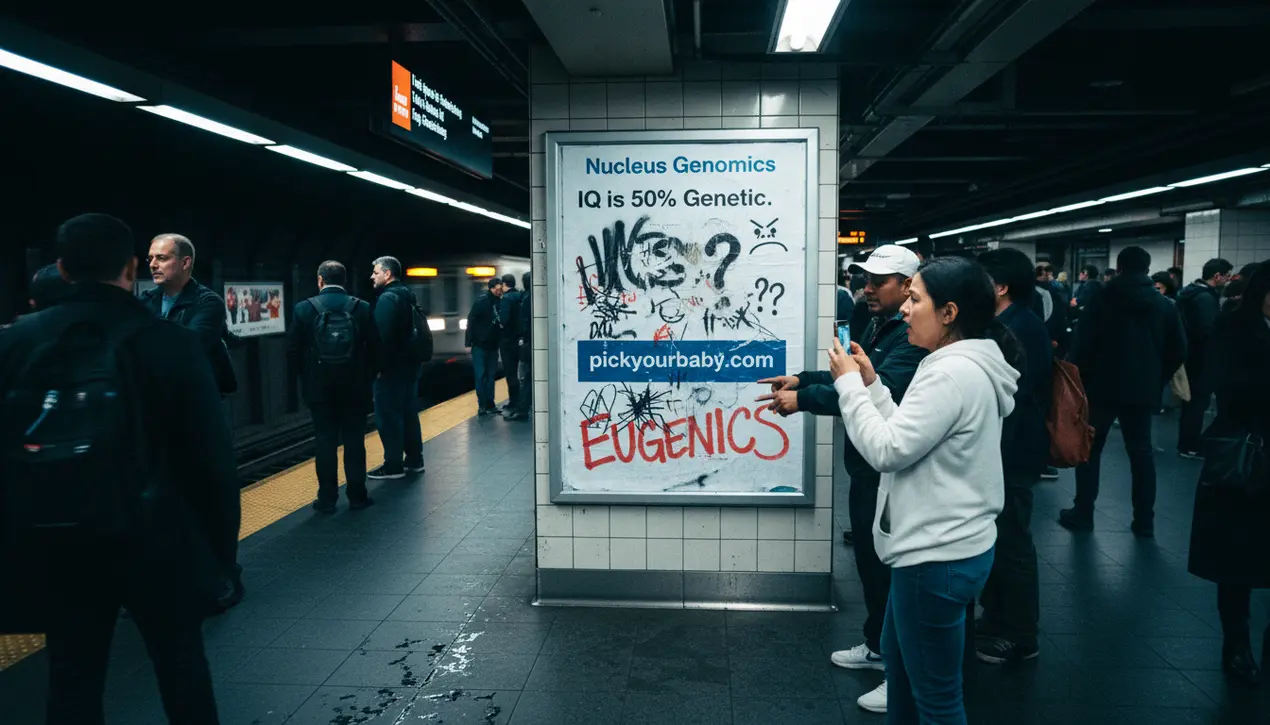
AIai safety & ethicsResponsible AI
Why so many brands want to piss you off
MI
Michael Ross
6 hours ago7 min read2 comments
If you were to ask a New Yorker about the latest controversial ad campaign plastered across the subway system, you'd likely be met with a moment of genuine confusion—not because these campaigns are forgettable, but because there have been so many vying for public outrage recently. In a span of just two months, the city's transit network has become a battleground for a new, deliberately provocative marketing strategy.First came Friend, an AI company that spent a staggering $1 million on ads featuring servile messages like 'I’ll never leave dirty dishes in the sink,' which were almost immediately vandalized—a outcome its CEO, Avi Schiffman, later admitted was not just anticipated but designed for, with white space intentionally left to invite public defacement. Hot on its heels, Nucleus Genomics launched its own incendiary campaign, with phrases such as 'Height is 80% genetic,' 'IQ is 50% genetic,' and the unnervingly direct 'Have your best baby,' directing curious—or horrified—commuters to a website bluntly named pickyourbaby.com. This campaign, the company revealed, was inspired by the recent Sydney Sweeney American Eagle ad that many critics lambasted as a casual promotion of eugenics, illustrating a disturbing trend where brands are no longer shying away from their most contentious attributes but are instead amplifying them with the precision of a political strategist.This represents a significant evolution in rage bait marketing, moving beyond the shock-value stunts of a P. T.Barnum into a calculated, modern playbook perfectly suited for our era of deep political and technological schisms. For companies like Nucleus, founded by 25-year-old Kian Sadeghi on the premise of 'genetic optimization' through embryo screening for traits ranging from disease risk to eye color and IQ, controversy is inherent to the product itself.As Joshua Lewis, an assistant professor of marketing at NYU’s Stern School of Business, explains, intentional polarization can be a rational strategy: by enraging those who would never use their services anyway, these companies forge stronger loyalty within their target demographic, effectively turning potential customers into ardent defenders. The numbers appear to validate this cold calculus; Nucleus reported a 1,700% surge in sales for its IVF+ services following the campaign, while Friend’s vandalism-strewn ads were deemed an 'overwhelming success' in generating media coverage.Elizabeth Paul, chief strategy officer at The Martin Agency, notes that in a landscape where 85% of ads fail to even register for comprehension, the threat of invisibility far outweighs the risk of rejection, especially for nascent categories like AI companions and advanced genetic screening. Yet, as Jaime Robinson, cofounder of Joan Creative, observes, what distinguishes this new wave is its fearless audacity to 'say the quiet part out loud.' Where a pantyhose ad featuring Joe Namath or a Nike campaign with Colin Kaepernick courted controversy around a product that was not inherently divisive, companies like Friend and Nucleus are built upon foundations that many find ethically abhorrent—the replacement of human connection with AI, the commodification of children's traits—and are now brandishing these features not as necessary evils but as primary selling points. Robinson aptly describes this shift as trading a 'dog whistle for a foghorn,' a tactic she and others attribute to a political climate where norm-shattering rhetoric has been mainstreamed.The online backlash was swift and visceral, with TikTok videos amassing millions of views decrying the 'dystopian' ads and Threads posts lamenting a slide into eugenics, but this public outrage is precisely the engine of the strategy. It fuels the algorithmic amplification on social media, where anger and fear are potent currencies, and generates the kind of free, widespread media attention that would be otherwise unaffordable for a young startup.The long-term consequences, however, remain deeply uncertain. While this approach can deliver explosive short-term growth, it risks cementing a brand's identity in the public consciousness as fundamentally antagonistic, potentially alienating future partners, regulators, and even a broader consumer base as the company matures.Furthermore, it raises profound questions about the social responsibility of corporations in an increasingly fragmented society. Are we witnessing a temporary marketing fad, or the birth of a new, permanent fixture in the advertiser's toolkit, one that willingly embraces societal division as a core business function? As these companies demonstrate, in the attention economy, being hated by the right people can be just as valuable as being loved by your customers, a precarious balancing act that challenges our very understanding of brand building and corporate ethics in the 21st century.
#rage bait marketing
#controversial advertising
#AI ethics
#brand strategy
#featured
#Nucleus Genomics
#Friend AI
#embryo selection
Stay Informed. Act Smarter.
Get weekly highlights, major headlines, and expert insights — then put your knowledge to work in our live prediction markets.
Related News
Comments
Loading comments...
© 2025 Outpoll Service LTD. All rights reserved.